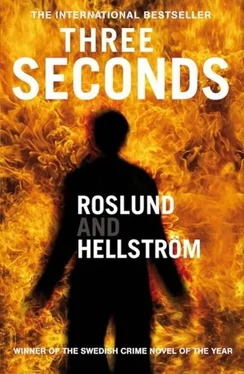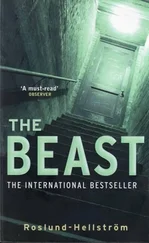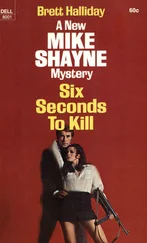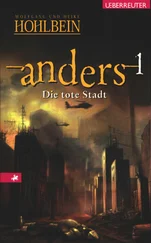Hoffmann brought his free fist down on the prisoner's neck with force. He didn't know why, it was just what happened when he couldn't answer. After all, it was true. Wojtek's runner was right.
"Take down some packing tape. Bind his wrists! And then pull off the cord!"
Jacobson stood on his toes as he lifted a roll of the hard gray plastic packing tape that is used for cardboard boxes down from the shelves over the press machine. He had to cut two half-meter lengths and tape them around the prisoner's arms, tight, until it cut into the skin and made it bleed, then he had to rip the clothes from the kneeling prisoner and undress himself, each piece of clothing on the floor in two piles, then he had to turn round, his naked back to Hoffmann, the hard plastic around his own wrists as well.
Piet Hoffmann had carefully remembered everything about the room that smelled of oil and diesel and dust. He had located the surveillance cameras over the drilling machine and the smaller pallet jacks, paced out the distance between the rectangular workbenches and the three large pillars that held up the ceiling, he knew exactly where the diesel barrel was and which tools were kept in what cupboard.
The prisoner with no name and the gray-haired guard were on their knees, naked, with their hands behind their backs. Hoffmann checked again that they were properly bound, then lifted up both piles of clothes and carried them over to a workbench near the wall with the big windows facing the church. The receiver was in one of his front pockets. He put it in his ear, listened, smiled, and looked out of the window toward the church tower-he heard the wind blowing gently across a transmitter, it worked.
Then the wind was drowned out.
A loud, repetitive sound took over.
The alarm.
He hurried toward the piles of clothes, grabbed the plastic thing that was flashing red from the belt in the waist of the blue uniform trousers and read the electronic message.
B.1.
Solitary confinement. The unit they had just left. It was sooner than he had expected.
He looked out through the window.
Toward the church. Toward the church tower.
He still had another fifteen minutes before the first police reached the outer wall. And another couple of minutes before the correctly trained staff were in the correct position with the correct weapons.
The alarm had been raised by one of the principal officers who was on his
way to the prison yard, but who on passing the closed door to the stairs had popped in to say morning and to check that everything was okay. The first guards now rushed down the dimly lit corridor, then all stopped at the same time, all looking at the same scene.
A dead man lying on the floor.
Persistent banging on locked cell doors from confused and aggressive prisoners.
A pale and sweating colleague was released from Cell 6.
The released colleague was agitated and pointed to Cell 3.
Another imprisoned colleague was let out, a young man who was crying-he looked down at the floor and said something, he shot him, and then repeated it much louder, as if to drown out the banging, or perhaps because he needed to say it again, he shot him through the eye.
He heard them storming up the stairs, and saw even more rushing over the prison yard. The two naked bodies on the floor twitched anxiously. He moved the gun from one face to the other, the eyes, reminding them: he needed some more time before they discovered him.
"What's this all about?"
The older warden, crouched over on his knees, his joints aching intensely, didn't say anything else but it was obvious that he was rocking back and forth to distribute the weight.
Piet Hoffmann heard him but didn't answer.
"Hoffmann. Look at me. What is this all about?"
"I've already answered that."
"I didn't understand the answer."
"Not dying yet."
The man leaned his head back, face up, and looked at the revolver with one eye and Hoffmann with the other.
"You won't get out of here alive."
He looked at him, demanding an answer.
"You've got a family."
If he spoke, became someone, changed from an object to a subject, a person who communicated with another person…
"You've got a wife and children."
"I know what you're doing."
Pier Hoffmann moved, walked behind the naked bodies, maybe to check that the plastic tape round their wrists was still in place, but probably to avoid the watching, demanding eyes.
"You see, I have too. A wife. Three children. All grown up now. It-"
"Jacobson? Is that what you're called? Shut up! I just said in a friendly way that I know exactly what you're fucking up to. I don't have a family. Not now."
He pulled at the plastic which cut in deeper, bled some more.
"And I'm not going to die, yet. If that means that you have to die instead, so fucking what. You're just my protection, Jacobson, a shield and you'll never be anything more than that. With or without your wife and children."
The principal officer from B2 had tried to make a connection with the colleague he had just released from Cell 3 a couple of minutes ago. A young man, not much older than his son, just covering for the summer. He hadn't even been there a month yet. That's the way it goes. Someone might spend their entire working life waiting for a morning like this. Others could experience it after only twenty-four days.
Only the one sentence.
He had repeated the same thing in answer to every question. He shot him, through the eye.
The young warden was suffering from acute shock-he had seen a man die and had had a gun pressed to his eye, the circle on the soft skin still obvious. He had then sat and waited, locked inside a solitary confinement cell with death. There wouldn't be anymore words, not for a while. The principal officer instructed the guards who were nearest to look after him, and went on to the other colleague, the one who had been in Cell 6 and who was pale and sweaty, the one who whispered, but was perfectly audible.
"Where's Jacobson?"
The principal officer put a hand on his shoulder, which was thin and trembling.
"What do you mean?"
"There were three of us. Jacobson, he was here too."
The conversation had ended some time ago.
When the words dried up, he was irritated and hoped for more, something mitigating, calming, a continuation that assured him everything was fine now. But there wasn't anymore to say. The principal officer from B2 had explained all there was to explain.
Two guards locked in. A dead prisoner.
And an assumed hostage-taking.
The chief warden hit the receiver against the desk and a vase of yellow tulips fell to the floor. A third warden, Martin Jacobson, had been taken by an armed prisoner serving a long sentence who had been in solitary confinement, a certain 0913 Hoffmann.
He sat down on the floor, his fingers distracted by the yellow petals that floated in the spilled water.
Of course he had put up a protest. Just as Martin had later put up a protest.
I lied outright to a detective superintendent. I lied because you ordered me to. But this, I won't do this.
He tore the yellow petals to shreds, one at a time, small, porous strips that he dropped onto the wet floor. Then he reached over for the telephone receiver that was still hanging from the wire, dialed a number and didn't stop talking until he was absolutely certain that the general director had understood every word, every insinuation.
"I want an explanation."
A cough. That was all.
"Pål, an explanation!"
Another cough. And nothing more.
"You call me at home late at night and order me to move a prisoner back to the unit where he was threatened, and no questions. You tell me that it has to happen by this morning at the latest. Right now, Pål, that prisoner has a loaded gun aimed at one of my employees. Explain the connection between your order and the hostage-taking. Or I'll be forced to ask someone else the same questions."
Читать дальше












